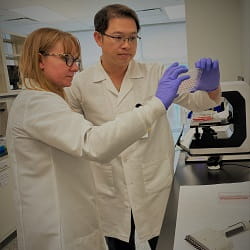UPMC & Pitt Develop New Cancer Immunotherapy

8/2/2021
PITTSBURGH – A new collaboration among
UPMC Hillman Cancer Center, the
University of Pittsburgh School of Medicine and New Jersey-based biotechnology company Avalon GloboCare Corp. aims to develop new cancer immunotherapy approaches and streamline manufacturing processes to bring these powerful treatments to cancer patients within days instead of weeks.
Cancer immunotherapy, which stimulates and trains a patient’s own immune system to target and kill tumors while leaving healthy cells intact, is an effective treatment for many cancer patients. One of these therapies, chimeric antigen receptor (CAR) T-cell therapy, alters a patient’s own T-cells to kill their cancer cells. This approach has been successful for some patients with leukemias, lymphomas and more recently, multiple myeloma, but only a limited number of patients have been able to benefit from these therapies.
CAR T-cell therapies approved by the U.S. Food and Drug Administration (FDA) are personalized therapies, made from the patient’s own cells. Current therapies use a DNA-based viral vector to engineer expression of the CAR against an antigen present on tumor cells. Patient cells are modified in the laboratory and infused back into the patient in a process that takes several weeks.
“With Avalon GloboCare FLASH-CAR™ technology, we will use an innovative messenger ribonucleic acid (mRNA)-based technology platform that will allow researchers to create CAR cellular therapies much faster than before—in just one to two days,” said Hsu. “We also believe this approach will reduce toxicity and overall cost associated with current CAR T-cell therapies, meaning more cancer patients could be eligible for this type of cellular therapy.”
The researchers also are using the technology to develop next-generation, personalized CAR T-cell therapies, including engineering cells that target more than one tumor antigen, enhancing their ability to target and kill cancer cells. Hillman’s IMCPL and Avalon GloboCare are developing a treatment for patients with relapsed or refractory B-cell lymphoblastic leukemia and non-Hodgkin lymphoma. Human clinical trials are poised to begin in mid-2022.
Another goal, according to Hsu, is to make “universal” or “off-the-shelf” CAR-based cancer immunotherapies. Unlike personalized treatments, this universal cellular therapy will be derived from a healthy donor, manufactured in bulk and readily available to treat patients without delay.
“A clinician could order this cellular immunotherapy in the same way as antibody or cancer medications taken orally, reducing the time a patient has to wait for treatment. Because this cellular therapy would be made in a large batch, the cost of manufacturing would be much lower, resulting in a lower cost of the final cellular therapy products for patients,” said Hsu.
The researchers are also working to streamline and enhance the quality of CAR T-cell manufacturing with Avalon’s Point-of-Care Modular Autonomous Processing System onsite at UPMC Hillman, a
National Cancer Institute-designated comprehensive cancer center.
As an FDA-registered, Foundation for Accreditation of Cellular Therapy-accredited laboratory, the IMCPL supports investigator-initiated research and technical expertise in translating laboratory research into clinical biologic products. The mission of the lab is to deliver high-quality and safe translation of cutting-edge scientific breakthroughs into cellular therapies for improving cancer care and human health.
PHOTO INFO: (click image for high-res version)
CREDIT: Yen-Michael S. Hsu
CAPTION: Jennifer Muzzio, lead technician (left), Yen-Michael S. Hsu, M.D., Ph.D. (right), director of the Immunologic Monitoring and Cellular Products Laboratory at UPMC Hillman.

 The new collaboration, led by Yen-Michael S. Hsu, M.D., Ph.D., director of the Immunologic Monitoring and Cellular Products Laboratory (IMCPL) at UPMC Hillman, seeks to develop next-generation CAR-based cellular therapies to make them accessible to a wider range of cancer patients.
The new collaboration, led by Yen-Michael S. Hsu, M.D., Ph.D., director of the Immunologic Monitoring and Cellular Products Laboratory (IMCPL) at UPMC Hillman, seeks to develop next-generation CAR-based cellular therapies to make them accessible to a wider range of cancer patients. 
